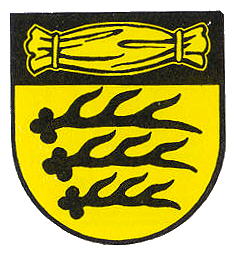Beutelsbach (Weinstadt): Difference between revisions
Knorrepoes (talk | contribs) m (Text replace - "|width="15%"|50 px|right |}" to "|width="15%"|50 px|right |}<seo title="Wappen, Gemeindewappen" />") |
Knorrepoes (talk | contribs) m (Text replace - "[[Literature" to "{{media}} [[Literature") |
||
| Line 20: | Line 20: | ||
In 1930 the village adopted arms with a combination of the sack and the deer antlers of Württemberg. The colours were described as those of Württemberg (black and gold), but it took until 1953 before the arms were officially granted. | In 1930 the village adopted arms with a combination of the sack and the deer antlers of Württemberg. The colours were described as those of Württemberg (black and gold), but it took until 1953 before the arms were officially granted. | ||
{{media}} | |||
[[Literature]] : Gönner and Bardua, 1970 | [[Literature]] : Gönner and Bardua, 1970 | ||
Revision as of 18:54, 8 July 2014
| Heraldry of the World Civic heraldry of Germany - Deutsche Wappen (Gemeindewappen/Kreiswappen) |
BEUTELSBACH
State : Baden-Württemberg
District (Kreis) : Rems-Murr Kreis (until 1973 Waiblingen)
Incorporated into : 1975 Weinstadt
Origin/meaning
The arms were granted in 1953.
The arms show in the upper half a canting sack ('Beutel'). This sack already appeared in the Waiblingen town hall in 1577 and on border stones from the 17th century, and always in a rather elongated shape. In the 18th century seals of the village the sack appears as well, but placed diagonally in the shield. In the 19th century the arms of the village were described as a red sack in a silver field.
In 1930 the village adopted arms with a combination of the sack and the deer antlers of Württemberg. The colours were described as those of Württemberg (black and gold), but it took until 1953 before the arms were officially granted.
Contact and Support
Partners:
Your logo here ?
Contact us
© since 1995, Heraldry of the World, Ralf Hartemink 
Index of the site
Literature : Gönner and Bardua, 1970











